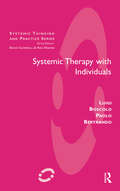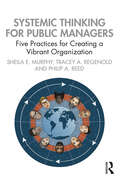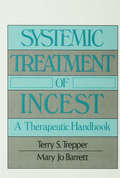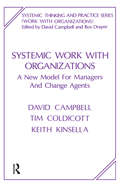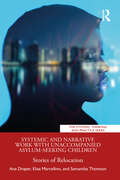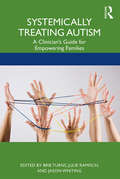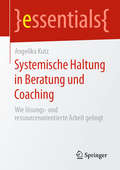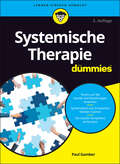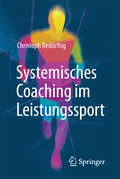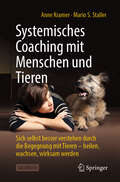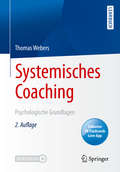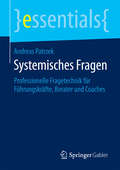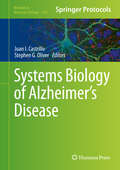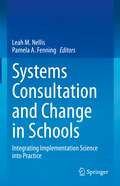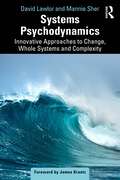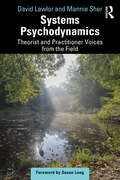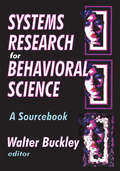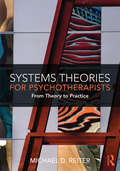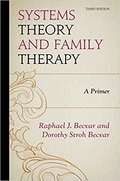- Table View
- List View
Systemic Therapy with Individuals (The Systemic Thinking and Practice Series)
by Paolo BertrandoThe authors describe the work they are doing with individual clients in Milan. Locating themselves clearly within the tradition of the Milan approach and more recent social constructionist and narrative influences, and articulating continually a broad systemic framework emphasizing meaning problems in context and relationship, they introduce a range of ideas taken from psychoanalysis, strategic therapy, Gestalt therapy and narrative work. They describe the therapy as Brief/Long-term therapy and introduce new interviewing techniques, such as connecting the past, present and future in a way that releases clients and helps them construct new narratives for the future; inviting the patient to speak to the therapist as an absent family member; and working with the client to monitor their own therapy. The book is written with a freshness that suggests the authors are describing "work in progress", and the reader is privy to the authors' own thoughts and reactions as they comment on the process of their therapy cases. This is a demystifying book, for it allows the reader to understand why one particular technique was preferred over another.
Systemic Thinking for Public Managers: Five Practices for Creating a Vibrant Organization
by Philip Reed Sheila Murphy Tracey RegenoldOffering a pathway to vibrant organizations, this book integrates systems thinking, critical thinking, and design thinking, and provides the tools needed to proactively apply them in the social systems where we live and work. Systemic thinking—the combination of systems thinking, critical systems thinking, and design thinking—provides a way of addressing the complexity of problems faced by public sector managers. Far too often systemic thinking has been discussed theoretically rather than practically. This book changes that, enabling public sector managers and leaders to connect staff, partners, and stakeholders in the pursuit of thoughtfully designed and responsive service. Clearly written and designed to be put to immediate use on the job, each chapter provides a discussion of one specific practice. Included are guiding principles, a case study, relevant practical tools, and suggestions of for additional practice and reading.Using this book, managers of social systems such as public welfare, healthcare, public schools and libraries, housing and community development, and students of public administration will gain a deeper understanding of organizational systems and design, and a new toolkit to fortify their own organizations.
Systemic Treatment Of Incest: A Therapeutic Handbook (Psychosocial Stress Series #No. 15)
by Mary Jo Barrett Terry TrepperSystemic Treatment of Incest is the first book to take as its primary focus the treatment of incest families. The authors, who have spent a total of 25 years working with incest families, believe that therapy can succeed in halting the abuse without dissolving the family unit. The volume’s three sections are based on the authors’ three stages of therapy: creating a context for change; challenging behaviors, expanding alternatives; and consolidation. First published in 1990. Routledge is an imprint of Taylor & Francis, an informa company.
Systemic Work with Organizations: A New Model for Managers and Change Agents (The Systemic Thinking and Practice Series)
by David Campbell Tim Coldicott Keith KinsellaSystemic Work with Organizations explores a powerful new perspective on the challenges faced by managers and consultants who work in large organizations. Building on principles and methods originally developed in the family arena, the authors show how an emphasis on connection, context and communication can help managers and others involved in change, deal with issues of identity, leadership, and learning faced by staff in today's complex work environment.The main thesis is that one way cause and effect thinking and a central focus on the role of the individual, is no longer sufficient. Managers and change agents now need to make use of the insights and interventions offered by a systemic perspective that highlights the roles played by circularity and reflexivity in how people construct shared meaning in human systems.
Systemic and Narrative Work with Unaccompanied Asylum-Seeking Children: Stories of Relocation (The Systemic Thinking and Practice Series)
by Ana Draper Elisa Marcellino Samantha ThomsonSystemic and Narrative Work with Unaccompanied Asylum-Seeking Children: Stories of Relocation provides a contextualised, research-based understanding of how to enhance and support the emotional health and well-being of unaccompanied asylum-seeking children.The framework presented in this book is an innovative intervention that enhances the well-being of children who have experienced trauma by improving the therapeutic abilities for all who support and care for them. This book presents the evidence base for this new systemic and narrative trauma-informed framework of care, creates a wider understanding of working with trauma responses in unaccompanied asylum-seeking children and offers coherence for practitioners wanting to use this approach. The authors provide a physiological view, as well as identify embodied aspects of trauma experience, and describe a narrative approach developed from a clinical understanding of trauma, as well as presenting the words of children who took part in the project. Creating a common multi-disciplinary language, this approach can be used to improve coherence, coordination, and excellence within the whole system.This book is essential reading for all practitioners working with unaccompanied asylum-seeking children. It will also be of interest to students and trainees of social work and other mental health disciplines, as well as other professionals seeking to understand the needs of this group.
Systemically Treating Autism: A Clinician’s Guide for Empowering Families
by Jason B. Whiting Brie Turns Julie RamischSystemically Treating Autism provides a unique resource for family therapists and other mental health professionals who want to increase their understanding of families with children with autism spectrum disorder (ASD). Through a combination of research, practical interventions, and case vignettes, this text covers the diagnosis of ASD, how ASD impacts the family, systemic theories that can be used when treating families with children with ASD, spirituality and cultural dynamics, and collaboration with other professionals. Providing a systemic framework for conceptualizing a diagnosis that is typically discussed from an individual perspective, this book guides mental health clinicians toward a better understanding of how they can help the entire family unit.
Systemik für ganzheitliche Resilienz im permanenten Wandel der agilen VUCA/BANI-Welt: Wieso der systemische Ansatz so heil- und wirksam ist für die nötigen Anpassungen in der digitalen VUCA/BANI- und KI-Welt (essentials)
by Angelika KutzAngelika Kutz LL.M. beschreibt, wieso die Systemik mit der Systemische Haltung so heil- und wirksam ist für die nötigen Anpassungen in der digitalen VUCA/BANI- und KI-Welt und zeigt Möglichkeiten und Wege auf, den rasanten Veränderungen spielerisch-neugierig und resilient zu begegnen.
Systemische Haltung in Beratung und Coaching: Wie lösungs- und ressourcenorientierte Arbeit gelingt (essentials)
by Angelika KutzIn diesem essential wird gezeigt, dass das Handlungsportfolio der Systemik eine wunderbare Grundlage bietet, um Klienten – oder auch ein Klienten-System – bestmöglich dabei zu unterstützen, Veränderungsprozesse (Change) einzuleiten und zu gestalten und für das Klientensystem passende Lösungen zu erarbeiten. Die systemische Haltung ist zudem erlernbar, ein heilsamer Wegbegleiter in allen Lebenslagen und stellt einen kontinuierlichen Reifungsprozess dar.
Systemische Psychotherapie: Lehrbuch für Studium und Weiterbildung (Psychotherapie: Studium & Ausbildung)
by Astrid Beermann Björn Enno HermansDieses Lehrbuch für das Psychotherapiestudium sowie die postgraduale Aus- undWeiterbildung vermittelt praxisnah und didaktisch hochwertig die Grundlagen undAnwendungsformen der Systemischen Psychotherapie im Umgang mit psychischen Störungen.Die Inhalte, die sich mit erkenntnistheoretischen Grundlagen, typischen Vorgehensweisen und Merkmalen sowie Anwendungsbereichen systemischer Therapie vielseitig und vertieft befassen, orientieren sich am Gegenstandskatalog für die schriftlichen Prüfungen nach dem Psychotherapeutengesetz und der Psychotherapie-Richtlinie und werden kompetenzorientiert („Vom Kennen zum Können“) anhand eines multimodalen Lehrbuchkonzepts vermittelt: Lesetexte werden mit digitalen Medieninhalten (z. B. Videos, Audios) ergänzt. Fallbeispiele, praxisbezogene Anregungen, Reflexionsfragen und Übungsangebote zeigen die Praxisnähe, Diskussionen zu einzelnen Aspekten vertiefen das Wissen, veranschaulichen verschiedene Perspektiven der systemischen Sichtweise und regen zum Weiterdenken und zu Diskursen an.
Systemische Strategiearbeit in Organisationen: Strategiekompetenz für Entscheider und Berater (essentials)
by Volker Köhninger Andrea Mikoleit Thorsten VeithMegatrends und Disruptionen verändern die Organisationswelt radikal und erfordern neue Formen der Unternehmenssteuerung. Neben Strategiekompetenz werden die Verantwortungs- und Entscheidungskultur sowie die Lernfähigkeit von und in Organisationen essentielle Faktoren für zukünftigen Erfolg sein. Systemische Strategiearbeit liefert hierfür Anregungen und Konzepte – zur Gestaltung einer modernen Zukunftsarbeit.
Systemische Strukturaufstellungen in Beratung und Management: Das Implizite Und Unbewusste Wissen Für Entscheidungen Aktivieren
by Marlen Gabriele ArnoldDieses Buch bietet fundierte Einblicke in eine faszinierende neue Methode, mit der Systeme erfasst, abgebildet und erprobt werden können. Inhaltlicher Schwerpunkt sind betriebswirtschaftliche und organisationale Faktoren. Die Autorin beschreibt Entscheidungsherausforderungen in den Bereichen Individuum, Organisation und System. Sie zeigt verschiedene Aufstellungsformate für das systemische Arbeiten im Managementkontext. Neben der theoretischen Aufbereitung werden praktische Beispiele auf allen drei Ebenen (Person, Organisation und System) anschaulich dargestellt und visualisiert. Prägnante Bilder der Aufstellungen unterstützen das Verständnis und veranschaulichen, wo konkrete Nutzungspotenziale liegen.
Systemische Therapie für Dummies (Für Dummies)
by Paul GamberMöchten Sie etwas in Ihrem Leben verändern? Ihre Beziehungen zu Familienmitgliedern, Ihrem Partner oder zu Kollegen positiver gestalten, Ihre Ängste oder nagende Eifersucht verlieren, sich von zwanghaften Gewohnheiten befreien oder Ihr Leben wieder ohne zerstörerische Grübeleien genießen? Interessieren Sie sich für eine Psychotherapie, scheuen aber die schmerzhafte Betrachtung alter Wunden? Dann ist dieses Buch das richtige für Sie. Paul Gamber zeigt anhand vieler Bespiele, wie Beziehungen, die Systeme, in denen wir leben, uns formen, stärken, aber auch krank machen können und wie Sie lernen, die Sichtweisen über sich und Ihre Beziehungen zu verändern. Er erklärt, wie die Systemische Therapie auf Ihren Stärken aufbaut, sich Lösungen zuwendet und nicht Problemen, und wie Sie Ihre Kraftquellen wieder erkennen. So können Sie Ihren Blick nach vorn richten und gestärkt dem Alltag begegnen.
Systemisches Coaching im Leistungssport
by Christoph BedürftigAls systemischem Berater und Wettkampfsportler ist es Christoph Bedürftig ein Bedürfnis, seine Erfahrungen aus zahlreichen eigenen Wettkämpfen, die Sorgen eines heranwachsenden Leistungssportlers und die der Eltern mit der mentalen Herausforderung an die Leistungsstärke in einem Werk zu verbinden um den Lesern eine Idee davon zu vermitteln, was neben reinem Training heute mehr denn je zum Training gehört, um Spitzenleistungen im Sport zu erreichen. Immer wieder gilt es zu betonen, dass sich Topsportler zumeist „nur“ mental in ihrer Leistung von der erweiterten Spitze abheben. Sie sind in der Lage, in den entscheidenden Momenten des Wettkampfes eine „Schippe“ drauf zu legen. Und genau diese Eigenschaft kann trainiert und erlernt werden. Mit welchen Methoden soll diese Buch durch Praxistipps, Theorie und Fallbeispiele unter Beweis stellen.
Systemisches Coaching mit Menschen und Tieren: Sich selbst besser verstehen durch die Begegnung mit Tieren – heilen, wachsen, wirksam werden
by Anne Kramer Mario StallerDieses Buch haben wir für dich geschrieben, damit du deine eigenen Potentiale und Ressourcen entdecken und weiterentwickeln kannst. Du hast vielleicht die Sinnhaftigkeit in deinem Tun verloren oder steckst in zwischenmenschlichen Konflikten oder ungesunden Dynamiken fest. Zeit, aus neuen Blickwinkeln auf dich und deine Systeme zu schauen! Auch Coaches und Therapeut:innen, die systemisch und tiergestützt mit ihren Klient:innen arbeiten (möchten), werden profitieren. Wir alle kennen dieses Tunnel-Gefühl: wir hängen in einer Situation fest, fühlen uns unwohl, sehen keinen Ausweg. Veränderungsversuche waren bislang nicht erfolgreich. Unsere Erfahrung zeigt: Um nicht wieder in alte Muster zu verfallen, müssen die größeren umgebenden Strukturen in den Prozess miteinbezogen werden. Und um unsere eigene Wirksamkeit in den Strukturen zu erkennen, brauchen wir manchmal ganz neue Perspektiven – diese können uns nicht nur andere Menschen, sondern auch Tiere bieten. Die wertvolle Kombination aus systemischem Coaching und der Interaktion mit Tieren (auch mit deinem eigenen Tier zu Hause) stellen wir dir hier vor. Anhand von acht Fallbeispielen aus unterschiedlichen Lebensfeldern wie „Arbeit“, „Familie“, „Freundeskreis“ oder „Schule“ werden wir die großen Themen, die uns regelmäßig begegnen, veranschaulichen: Es geht um Nähe und Distanz, um Kontrolle und Vertrauen, Macht und Ohnmacht, Anspannung und Entspannung, Selbst und Andere, Festhalten und Loslassen, Freude und Trauer, und um das „Sein“ und das „Werden“. Dabei werden wir dir Ideen und Impulse mitgeben, um diese Themen für dich selbst durch neue Beobachtungsbrillen zu betrachten. Aus Erfahrung wissen wir: Dies ist ein ganz anderer Ansatz als das, was unsere Klient:innen bisher ausprobiert haben. Unser Ansatz ist nicht-linear: Du musst nicht das ganze Buch chronologisch lesen; du kannst dir die Themen herauspicken, die dich am meisten interessieren. Es erwarten dich viele Beispiele aus dem realen Leben, neue Denk- und Beobachtungsansätze sowie zahlreiche konkrete Impulse zum Transfer in deine eigene Lebenssituation.
Systemisches Coaching: Psychologische Grundlagen
by Thomas WebersDieses Lehrbuch gibt eine kompakte und übersichtliche Einführung ins Business-Coaching. Dies geschieht einerseits auf Basis der modernen Systemtheorie, deren Relevanz für Coaching erschlossen wird. Andererseits werden die zentralen Grundlagen der wissenschaftlichen Psychologie für Coaching herausgearbeitet und in Anwendung gebracht. In dieser Kombination erweist sich Coaching als evidenzbasierte professionelle Dienstleistung – und dieses Werk als geeignete Lektüre für Studierende und Coaching-Praktiker gleichermaßen.
Systemisches Fragen: Professionelle Fragekompetenz für Führungskräfte, Berater und Coaches (essentials)
by Andreas PatrzekDas essential stellt praxisnah dar, wie durch Fragekompetenz erfolgreiches Führen, Beraten und Coachen gelingt. Es bringt die wesentlichen Definitionen und Techniken auf den Punkt, vermittelt die theoretischen Grundlagen und Strategien und zeigt die Umsetzung. Orientiert an zentralen Merkmalen des systemischen Ansatzes wird die Kunst der Fragekompetenz verständlich dargestellt. Mit zahlreichen konkreten Beispielen und Formulierungshilfen für die tägliche Praxis.
Systemisches Fragen: Professionelle Fragetechnik für Führungskräfte, Berater und Coaches (essentials)
by Andreas PatrzekDas kompakte Buch stellt praxisnah dar, mit welchen Fragetechniken erfolgreiches Führen, Beraten und Coachen gelingt. Es bringt die wesentlichen Definitionen und Techniken auf den Punkt, vermittelt die theoretischen Grundlagen und Strategien und zeigt die Umsetzung. Orientiert an zentralen Merkmalen des systemischen Ansatzes wird die Kunst der Fragetechnik verständlich dargestellt. Mit zahlreichen konkreten Beispielen und Formulierungshilfen für die tägliche Praxis.
Systemisches Fragen: Professionelle Fragetechnik für Führungskräfte, Berater und Coaches (essentials)
by Andreas PatrzekDas essential stellt praxisnah dar, mit welchen Fragetechniken erfolgreiches F#65533;hren, Beraten und Coachen gelingt. Es bringt die wesentlichen Definitionen und Techniken auf den Punkt, vermittelt die theoretischen Grundlagen und Strategien und zeigt die Umsetzung. Orientiert an zentralen Merkmalen des systemischen Ansatzes wird die Kunst der Fragetechnik verst#65533;ndlich dargestellt. Mit zahlreichen konkreten Beispielen und Formulierungshilfen f#65533;r die t#65533;gliche Praxis.
Systems Biology of Alzheimer's Disease
by Juan I. Castrillo Stephen G. OliverAlzheimer's disease (AD) and many other neurodegenerative disorders are multifactorial in nature, involving a combination of genomic, epigenomic, network dynamic and environmental factors. A proper investigation requires new integrative Systems Biology approaches, at both the experimental and computational level. The interplay of disease mechanisms and homeostatic networks will underlie the time of onset and rate of progression of the disease. This book addresses such an integrated approach to AD. It aims to present Systems Biology, including both experimental and computational approaches, as a new strategy for the study of AD and other multifactorial diseases, with the hope that the results will translate into more effective diagnosis and treatment, as well as improved public health policies. Written for the highly successful Methods in Molecular Biology series, practical and cutting-edge, Systems Biology of Alzheimer's Disease is intended for post-graduate students, post-doctoral researchers and experts in different fields with an interest in comprehensive Systems Biology strategies applicable to AD and other complex multifactorial diseases (including other neurodegenerative diseases and cancers). This book aims to complement other excellent volumes and monographs on AD that cover fundamental, physiological or medical aspects of the disease.
Systems Consultation and Change in Schools: Integrating Implementation Science into Practice
by Leah M. Nellis Pamela A. FenningThis book explores the ways in which systems (organizational) consultation may be applied to school roles and functions as part of an overall systems change process. Using an implementation science framework grounded in systems/organizational consultation research, the volume details how school reform or improvement may be facilitated. School-based case studies illustrate the application of implementation science to systems change efforts in schools and districts across the United States. Each case study describes the implementation science steps taken to deliver a school-based innovation at the systems level. The book discusses implementation science theory combined with real-world examples of its use in planning for, implementing, and engaging in ongoing evaluation of a systems change effort. Key areas of coverage include:Implementation science in educational settings.Key stakeholder roles in school-based systems change.Implementing and evaluating systems change in schools.Teacher-student mediation to reduce conflict and ensure effective school discipline and behavior practices.District-level processes and supports for English Language Learners.Mental health screening and social-emotional well-being of students. Systems Consultation and Change in Schools is an essential resource for researchers, professors, and graduate students as well as scientist-practitioners, school-based practitioners, and clinicians across such disciplines as school administration and leadership, school and clinical child psychology, social work, public health, teaching and teacher education, educational policy and practice, and all interrelated fields.
Systems Psychodynamics: Innovative Approaches to Change, Whole Systems and Complexity
by Mannie Sher David LawlorIn the second of this three-volume series, the authors expand on the theory and practice of systems psychodynamics – which integrates psychoanalytic thinking, open systems theory and complexity theory – in its applications to consultancy work in organisations and wider social contexts. Multidisciplinary and multitheoretical in nature, the systems psychodynamics paradigm develops from the understanding that no single theory or approach explains the complex nature of organisational systems. Replete with explanations of key theories, practical guidance and exercises, this book demonstrates how systems psychodynamics can be used by consultants to plan and put into action organisational changes in four main areas: change planning and management; action research and evaluation; leadership and whole systems; and professional development and next steps. In light of systems psychodynamics, rather than functioning as a leader of change processes, the role of an organisational development consultant is one of providing containment, understanding and facilitation for others to take up their leadership roles responsibly in their change processes. With a focus on practical application in real situations, this book will be invaluable for psychoanalysts, managers, policymakers, consultants and researchers in a wide range of professional and clinical settings.
Systems Psychodynamics: Theorist and Practitioner Voices from the Field
by Mannie Sher David LawlorThrough a series of in-depth interviews with Tavistock thinkers across three generations, this volume illustrates the practice and application of the systems psychodynamics paradigm to organisational development consultancy, research and training. Across 28 stimulating interviews with a group of international consultants, interviewees present a critical appraisal of the systems psychodynamics paradigm and its application to present-day social and organisational difficulties. By using a narrative interpretive method, the interviewers attend to the historical, psychosocial and biographical dynamics of the interviewees’ approaches and methods of work, and address several areas of organisational consultancy. These include organisational design, the division of labour, levels of authority and reporting relationships; the nature of work tasks, processes and activities; primary tasks and the inevitable unconscious dynamics within systems and individuals. The multi-disciplinary approaches of the interviewees will interest managers, policymakers, consultant practitioners and researchers to understand the variety of applications of systems psychodynamics methodologies.
Systems Research for Behavioral Science: A Sourcebook
by Walter BuckleySystems Research for Behavioral Science will be of interest to those in any discipline concerned with developments in science. It is addressed principally to the student of human behavior as that study is approached from the social side.Previously, the study of human behavior was the general area of science that had been slowest to respond to the exciting challenge of the modern systems outlook. Yet it is behavioral science that stands to gain the most from insights into the workings of more complex systems.The editor presents not only a fair selection of systems research in behavioral science, but also provides an extensive selection of important statements of general principles, including several already considered classics. Hence, this sourcebook may function in part as a principles text, exposing the initiate to original pioneering statements as well as later work inspired by them, and alerting the sizeable number of underexposed scholars who are over-familiar with the few terms such as feedback, boundary, input, and output, that there are much greater depths to plumb than meet the eye in semi-popular accounts of cybernetics.This volume is an overview of thinking that reflects a trend toward the system point of view. Some of the chapters are philosophical: they discuss the significance of the trend as a development in the contemporary philosophy of science. Some are inevitably detailed and technical. Still other chapters discuss the relevance of concepts that are central in the system approach, to particular fields of research. The picture that emerges is far from that of a unified theory. It is an open question whether much progress can be made by attempts to construct a "unified theory of systems" on some rigorous axiomatic base.
Systems Theories for Psychotherapists: From Theory to Practice
by Michael D. Reiter<p><i>Systems Theories for Psychotherapists</i> explores three key theories that underpin many of the models of psychotherapy: general systems theory, natural systems theory, and language systems theory. The book presents the aesthetics (how to see and understand what is happening) and the pragmatics (what to do in the therapy room) behind each theory. It also explores how therapists can successfully conceptualize the problems that clients bring to therapy, offering a range of contemporary examples to show how each theory can be applied to practice. <p>Starting with an introduction to systems theories, the book then delves into cybernetics, interactional systems, natural systems, constructivist theory, and social construction theory. Each chapter uses a distinctive case example to help clinicians to better understand and apply the theories to their own therapeutic setting. Woven throughout the book are three helpful learning tools: "Applying Your Knowledge," "Key Figure," and "Questions for Reflection," providing the reader with the opportunity to critically engage with each concept, consider how their own world view and preconceptions can inform their work with clients, and challenging them to apply prominent systems theories to their own practice. <p><i>Systems Theories for Psychotherapists</i> is a clear and valuable text for undergraduate and graduate students in mental health programs, including counseling, marriage and family therapy, social work and clinical psychology, as well as for all practicing clinicians.</p>
Systems Theory and Family Therapy: A Primer
by Dorothy Stroh Becvar Raphael J. BecvarThis book provides an overview of the basic concepts of a systems theoretical perspective using families and family therapy as examples and illustrations of their application in professional practice. This meta-perspective focuses on viewing problems in context. <P><P>The difference between first-order and second-order cybernetics is explicated. Readers then are invited to see themselves as parts of the systems with which they are working consistent with a second-order cybernetics perspective. Along the way a difference between modernism and post-modernism as well as constructionism and social constructionism also are described. In addition, theories of individual and family development are presented with implications for their use in family therapy. The book concludes with more than 100 examples of how the meta-perspective of systems theory can be used in work with families.
